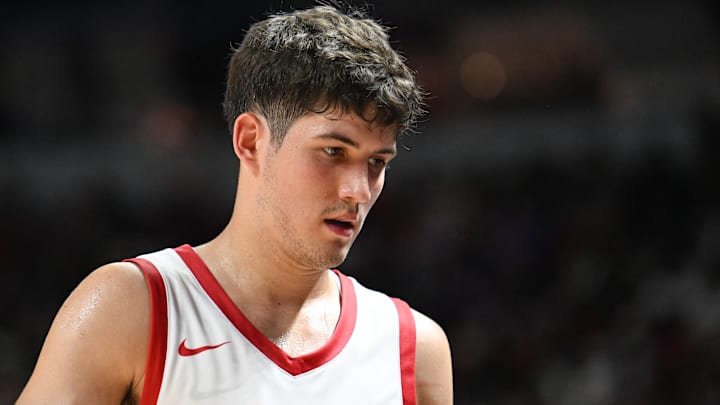As the Houston Rockets fell, 124-125, in their season opener against the Oklahoma City Thunder, the most glaring weakness of their current rotation became abundantly clear: the defensive liability that young point guard Reed Sheppard presents when he's on the court.
Throughout the night, the Thunder's quickest players picked on Sheppard repeatedly in order to collapse the Rockets' defense. However, as a result of the cramps that Amen Thompson suffered towards the end of the game and the team's general lack of backcourt depth, Sheppard still played extensive minutes.
While this flaw might not be exposed so obviously against less skilled teams, the Thunder, along with most of the other contenders in the West, will leave Houston with an impossible choice. Do they limit Sheppard's minutes while sacrificing the offensive viability of their backcourt?
Reed Sheppard's defensive limitations have left the Rockets in a painful spot
Coming into the league, Sheppard's profile as a player was crystal clear. He had the potential to be an elite perimeter shooter, having shot 52.1% from beyond the arc in his lone season at Kentucky, but his small frame and lack of athleticism and lateral quickness were likely to limit him defensively.
As he enters his second year in the NBA, this projection has largely come to fruition, meaning that, under normal circumstances, Sheppard would largely be in the Rockets' rotation just for developmental purposes this season.
However, the devastating injury to starting point guard Fred VanVleet has turned everything on its head.
Although Thompson, who looks likely to take over the starting point guard spot for the time being, has shown an ability to be a capable facilitator, he is not a true point guard through his natural skill-set.
Sheppard, therefore, is the team's only true point guard, as it stands, who has enough offensive upside to even be considered to take on a significant role in the rotation. If the Rockets were to bench him, even for one game based on their matchup, they would be left essentially without a point guard in their rotation.
With the way the team's offense appears to be constructed, through hunting mismatches in the paint and skimming perimeter shots off the edge of their zone approach, they need someone who can keep the ball moving and who can face pressure that opposing teams might put on whoever is bringing the ball down the court.
However, Sheppard's limitations certainly played a major role in Houston's loss to the Thunder, and they will continue to harm the team in their biggest moments unless he takes major strides in his ability to stay in front of his man.
As it stands, the Rockets are stuck between a rock and a hard place, and it remains to be seen if they will find any sort of solution this season.
